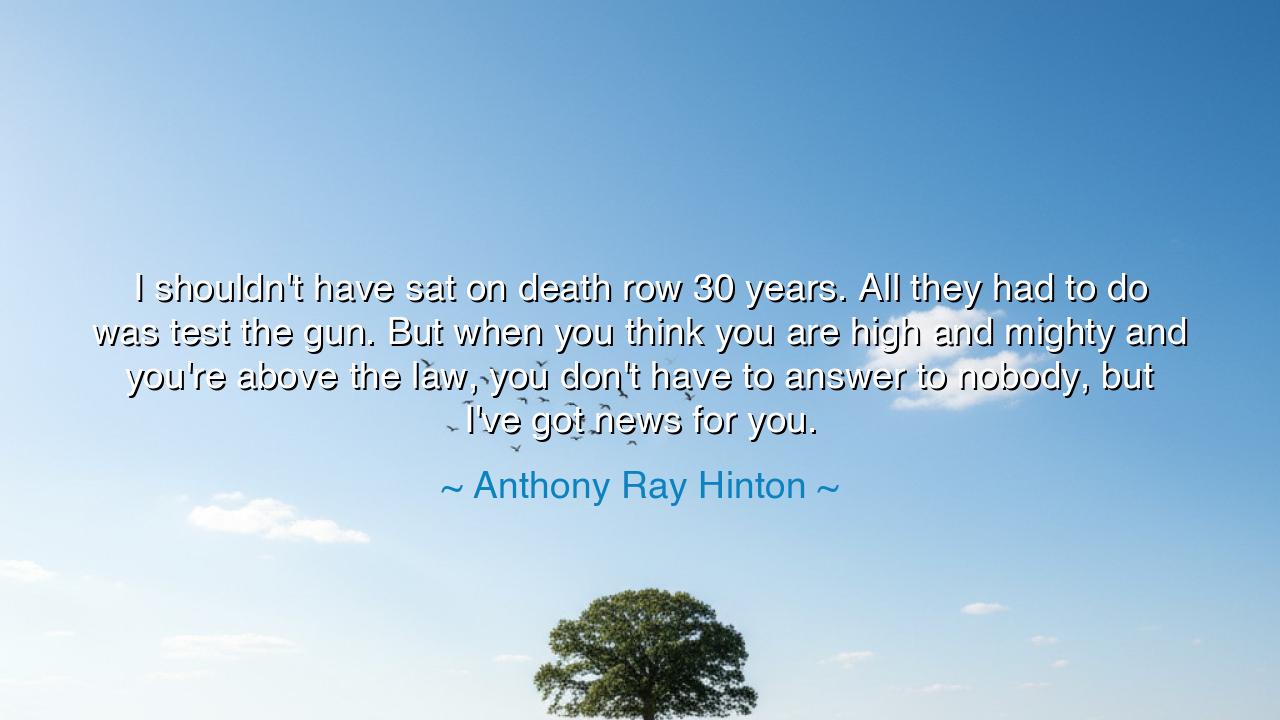
I shouldn't have sat on death row 30 years. All they had to do
I shouldn't have sat on death row 30 years. All they had to do was test the gun. But when you think you are high and mighty and you're above the law, you don't have to answer to nobody, but I've got news for you.






In the words of Anthony Ray Hinton, “I shouldn't have sat on death row 30 years. All they had to do was test the gun. But when you think you are high and mighty and you're above the law, you don't have to answer to nobody, but I've got news for you,” we hear the thunderous cry of justice rising from the depths of human suffering. These words are not the bitter musings of a broken man—they are the solemn testimony of one who has walked through the valley of injustice and emerged with truth blazing in his heart. In them lies the echo of every soul that has been silenced, every voice denied, and every innocent person crushed beneath the arrogance of power. His words are a mirror to both the cruelty and the redemption of the human spirit.
The meaning of this quote reaches beyond one man’s tragedy; it speaks to the corruption of power and the peril that follows when pride blinds the eyes of justice. Hinton’s imprisonment—three decades on death row for a crime he did not commit—was not simply the failure of a system, but the triumph of arrogance over truth. He reminds us that when men believe themselves “high and mighty,” they forget that the laws they wield are not theirs to own, but sacred trusts to uphold. The refusal to “test the gun,” to seek the truth that lay waiting in plain sight, was not mere negligence—it was the willful blindness born of pride. And so, his words are a warning: no matter how high one stands, no mortal is above justice.
The ancients knew this truth well. Consider the tale of King Creon in Sophocles’ Antigone, who defied divine law by forbidding the burial of the dead. In his arrogance, he believed his authority greater than the will of the gods. But his pride led to ruin—the death of his son, his wife, and the collapse of his house. So too, those who condemned Hinton without evidence walked the same doomed path, placing their judgment above truth, their pride above mercy. Hinton’s “I’ve got news for you” resounds with the same moral reckoning that felled kings and tyrants alike: justice will have the final word.
There is a deeper power in Hinton’s voice—not vengeance, but righteous defiance. Though caged, he refused to let bitterness devour him. Thirty years of darkness could not extinguish his humanity. In the stillness of his cell, he came to understand what few ever grasp: that freedom of the soul is greater than freedom of the body. When the world abandoned him, he clung to faith, to laughter, to love. And when the truth at last set him free, he emerged not as a man consumed by rage, but as a prophet of forgiveness and truth. Such strength recalls the story of Nelson Mandela, who, after twenty-seven years in prison, declared that hatred would only imprison him further. Both men turned their suffering into light, their injustice into a testament of endurance and grace.
To hear Hinton’s words is to be reminded that justice is not a gift—it is a duty. It demands vigilance, humility, and courage from all who wield power. His story teaches that evil does not always roar like a beast; sometimes it wears the calm face of bureaucracy, of indifference, of those who believe “it is not my concern.” The lesson is as ancient as it is urgent: when good men remain silent, injustice becomes law. Every person, no matter how small their station, carries the sacred responsibility to seek truth, to question authority, and to defend the dignity of others.
Let this truth be a torch for our time: power without accountability is the enemy of freedom. When we exalt ourselves above others—when we think we are “high and mighty”—we invite downfall. But when we humble ourselves before truth, when we listen, when we act with justice, we restore what is divine in humankind. The hands that once condemned can also heal; the systems that once failed can be reformed, if courage leads the way. Hinton’s voice, rising from the ashes of injustice, calls not for hatred, but for awakening. It is both an indictment and a call to conscience.
So, to those who walk in positions of judgment, and to every heart that seeks wisdom, remember this: truth cannot be buried, and no one is above the law of righteousness. Seek justice not only in the courts, but in your daily life—in how you listen, how you forgive, how you stand for what is right even when it costs you. For as Anthony Ray Hinton reminds us, every act of arrogance, every refusal to face truth, builds a prison of the soul. But every act of courage, every step toward compassion and fairness, sets the world one measure freer. Justice may sleep, but it never dies—and when it awakens, it calls each of us to account.






AAdministratorAdministrator
Welcome, honored guests. Please leave a comment, we will respond soon